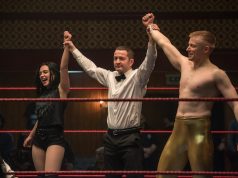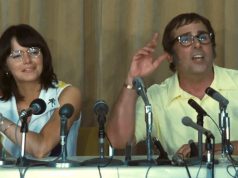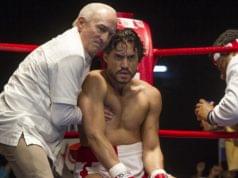“Seabiscuit” must be the long-awaited summertime version of an Oscar hopeful. It has the fine performances and dramatic heft of a late-fall picture, but drops the self-importance and plays up the feel-goodness the way the best summer crowd-pleasers do.
Written and directed by Gary Ross (“Pleasantville”), who adapted Laura Hillenbrand’s best-selling book, “Seabiscuit” tells the true story of a Depression-era racehorse who gave Americans a hero to root for when they desperately needed one. Without much effort at all, Seabiscuit the horse can be seen as a representative of America: strong and resilient, down but not out, bent but not broken. These colors don’t run, but that horse sure does.
In fact, Seabiscuit’s owner, a media-savvy automobile tycoon named Charles Howard (Jeff Bridges), makes that connection to reporters every chance he gets. “Seabiscuit just needed a second chance,” he says. “I think a lot of people out there feel like they could use a second chance, too.” Hokey? Yeah. But Charles Howard seems to mean it sincerely, and Jeff Bridges definitely does. Give us a movie that makes us feel good about ourselves, and about the old-fashioned American values of determination and fortitude, and we’ll go anywhere you want to take us.
Tobey Maguire plays Red Pollard, Seabiscuit’s jockey. Ross is not shy in playing up the parallels between Red and Seabiscuit, and Maguire’s scenes with the horse (a 4-year-old gelding called Fighting Furarri) are sweetly moving, like two old friends hanging out together. Maguire’s quiet, bookish persona fits the role to a T: This is indeed the kind of guy who would relate better to animals than to people.
There are a number of deft touches throughout the film. Period photos and documentary-worthy narration by David McCullough (who does this sort of thing for a living), interspersed with the story, give us context and inform us of America’s mood in the 1930s. William H. Macy lends a bit of comic relief as horse racing’s foremost radio personality, and Chris Cooper gives another stalwart, subtle performance as Seabiscuit’s kind-hearted trainer. I’m also quite impressed with Gary Stevens, a real-life jockey, not an actor, who plays Red’s jockey friend George Woolf. He plays a pivotal role in one of the film’s major race sequences, and he absolutely nails it. I was surprised, in fact, just how emotionally affecting that race was.
The film wins by uplifting us. It gives us underdogs, then lets the underdogs come off victorious  the easiest, most basic way to get an audience on its feet. That’s not a criticism  I’m not saying the film panders to us or manipulates us, because it surely doesn’t  but it does mean the film may not gain “classic” status. Its message and story are wonderfully simple, and viewing the film once is a delight. If its impact is no more far-reaching than that, then at least we have a crackerjack summer drama to enjoy for two hours and 20 minutes.
B+ (2 hrs., 21 min.; )





